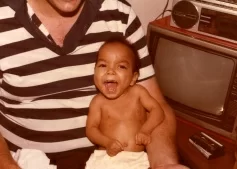 without a thought on my part. But Luke came to my mind yesterday and I looked up some information on him and discovered that his birthday had just passed. I found this old article that I wrote about Luke a few years ago. I thought I'd share it again. I am convinced that there are important and significant lessons we can learn from his life, and that I need to regularly share what I think they are. I hope you enjoy this!
without a thought on my part. But Luke came to my mind yesterday and I looked up some information on him and discovered that his birthday had just passed. I found this old article that I wrote about Luke a few years ago. I thought I'd share it again. I am convinced that there are important and significant lessons we can learn from his life, and that I need to regularly share what I think they are. I hope you enjoy this!The mysteries of God are a part of the Christian life that can often lead to confusion, doubt and even discouragement for believers.
- For some, it's a pride thing. We want to have answers – we want to understand, to be able to grasp the complexities of Biblical truth and God's plan for mankind.
- For some, God's mysteries – the unexplained things of life – are stumbling blocks to faith:
1. Why do bad things happen to good people?
2. Why does He allow pain, suffering and evil to thrive in our world?
Several months ago we were witnesses to the aftermath of the tragedy in Pennsylvania involving the Amish community, where, good, decent, hard working, non violent people were subjected to unspeakable cruelty towards their children. How can this happen?
3. One of our CSC children, who grew up in the worst poverty imaginable in Cebu City, was adopted into a family in the United States several years ago. Well meaning people would tell her how lucky she was and how God obviously had a wonderful plan for her life. She had a hard time with that and would sometimes ask her parents, "But what about all the kids who are still there, who weren't adopted, and who are still suffering and dying? What is God's wonderful plan for their lives? Why me and not them?
For many of us, we celebrate the goodness of God in our lives, we praise him for his healing, for material comforts, for blessing our efforts – even as we observe people who remain sick or disabled, who suffer in poverty – those who efforts and initiatives end in disappointment and ruin.
There are two extremes in terms of people's reactions to the things about God and life that are not understood.
1. There are those who try in vain to grasp the ungraspable – to be able to reduce the mysteries to understandable formulas or explanations. I remember a young seminarian who came to Cebu and who filled the pulpit of our church on a Sunday evening. He preached for an hour on the "peace of God that passes all understanding." Perhaps he felt that if he preached long enough he could crack that nut and open our understanding!
We all know those who have reduced the book of Revelation to precise charts and timetables, giving us easy to understand categories for all of human history and, most especially, the times to come.
2. A second category are those who shake their heads and say, "We'll only know these answers when we get to heaven." They suspend inquiry, not bothering to seek answers to the perplexing questions of life.
Living and working in a Third World country like the Philippines brings some of these mysteries to the front of our lives. Poverty, and all that goes with it, is "in your face." People often ask me "How do you like living in the Philippines?" That's a tough one to answer. Life anywhere has its highs and lows. Some days are great, others are difficult. I often answer this way:
1. When I'm sitting down to a nice breakfast I am aware that, within a few meters of my house are families that have no breakfast.
2. When I'm driving to the office or the Shelter I often pass people walking along the road who, for lack of a few cents can not even afford public transportation and must walk.
3. When I stop to buy medicine for my family or the CSC kids, there are people standing nearby whose children are dying for lack of that very same medicine.
Why am I blessed and they are not?
I recall a conversation with a missionary a few days after Cebu was hit by a strong typhoon. Many of our CSC workers lost their roofs or their entire homes. The houses of the poor were devastated by the high winds and torrential rains. The missionary said that it had been such a miracle how God spared the missionary homes from damage, holding his hands of protection around us during the storm. I remember wondering whether it wasn't more a matter of our having cement houses and strong metal roofs.
Why did our CSC kids have to suffer so much? And how much more, those who live on the street and cannot be admitted to CSC?
These are tough questions. When it comes to trying to understand our own suffering, the Bible gives some answers. For example, Romans 5:3-4 tells us that suffering produces perseverance, perseverance character, and character, hope. And the Bible gives us additional hope that we will someday come to see God's purpose and mysteries:
"But now we see through a glass dimly, but then face to face."
And we hear the testimonies of Christian brothers and sisters who have lived through terrible times and have turned negatives into positives in their lives.
Several months ago I was attending a conference in Bismark, North Dakota. One of the featured speakers was Steve Saint, Steve's father, Nate Saint, was one of the five missionaries killed in 1956 by Aucan warriors in Equador. Steve told about what that tragic day meant to his family, and what it was like when his dad, his hero, didn't come home that day. We saw video of his current family life, and saw a man who was interacting with Steve's children, and who was being referred to as "Uncle." It turns out that this was the very man who had killed Steve's father, who had come to know Jesus and had experienced the forgiveness of God and of the Saint family and now was a part of their family – an amazing story of how good things had come out of tragedy and suffering.
So the clear message is that God has a plan for our lives, we will discover that plan in the right time. He is writing our life's stories, but some of the chapters are difficult ones.
We can understand this. We can, when aided by the Holy Spirit, see how difficulties and suffering are part of a purification process for us, and that we, like Job, will eventually be better people for it.
But what about people who, because of major disabilities, are unable to understand their situation, unable to discern the hand of God or his plan for their lives. Where is the purification and growth and ultimate value for these people? What could God's purpose possibly be?
Back on 1982 a baby was born in a charity ward in a small hospital in Cebu City. 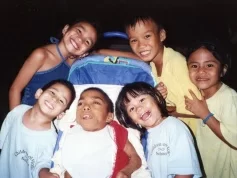 The baby underwent cardiac arrest during birth and was without oxygen for an extended time. Unlike many cases of charity patients, the hospital staff decided to resuscitate the baby, even after he had suffered massive brain damage and cerebral palsy. The baby's mother abandoned him in the hospital, and after a couple months Luke was referred to CSC. When we took him in he appeared to be a bouncing baby boy. We did not know that he would not develop physically beyond about a year and a half, or mentally beyond a few months. Luke would never speak, nor have voluntary movement of his arms or legs.
The baby underwent cardiac arrest during birth and was without oxygen for an extended time. Unlike many cases of charity patients, the hospital staff decided to resuscitate the baby, even after he had suffered massive brain damage and cerebral palsy. The baby's mother abandoned him in the hospital, and after a couple months Luke was referred to CSC. When we took him in he appeared to be a bouncing baby boy. We did not know that he would not develop physically beyond about a year and a half, or mentally beyond a few months. Luke would never speak, nor have voluntary movement of his arms or legs.
Luke became a fixture at CSC. For over 23 years he was an integral part of our lives and a symbol of CSC and what we are all about.
Many times Luke would be hospitalized – often due to upper respiratory infections. He fought for his life many times. There were at least a dozen times when we were sure that he would die. The doctors had told us that he wouldn't make it past five years old. Then they revised it to nine, then 11 – certainly he wouldn't reach his teenage years.
One time, when Luke was critically ill our staff met to pray and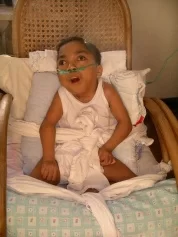 I asked them to reflect on his life. Here is why: I believe that God had a purpose for Luke's life when he created him. I believe that He uses people like Luke to teach us important things. But here is the rub: If we don't spend time reflecting on these lessons, then Luke's life is useless. Its up to us to allow God to make sense of Luke's life.
I asked them to reflect on his life. Here is why: I believe that God had a purpose for Luke's life when he created him. I believe that He uses people like Luke to teach us important things. But here is the rub: If we don't spend time reflecting on these lessons, then Luke's life is useless. Its up to us to allow God to make sense of Luke's life.
And what are the lessons that we found? What has God taught us through his life?
1. First, life is precious. Even though he had nothing to live for, from the world's point of view, Luke clung to live almost ferociously. Some of us who have much more to live for take life casually, we take life for granted. Not Luke. Every day was a struggle. Every breath had to be fought for. Life is a gift from God and we should treat it carefully.
2. God has provided us with opportunities, through Luke's life, to minister to him in significant and life-saving ways. He has provided an avenue for us to live out the biblical mandate to minister unto the "least of these," because, truly, Luke was in that category. Hundreds of people have been given a blessing to participate in the support of CSC that reaches out to children like Luke and many others with other special needs.
3. In so doing, He has given us a chance to show others a Godly value system that doesn't reserve love and attention for those who have something to give back, or who have "potential" or a bright future. For many people who live in a developing country, where resources are limited, this has been a difficult lesson to learn. How could we justify spending so much money for Luke's hospitalization when other, "normal" kids needed care? Luke's life gave us the opportunity to teach about the value of life and about how God looks at all of us.
4. Luke has been a tremendous ambassador for CSC. People around the world remember observing the loving care that he received by our staff and workers. They remember his famous smiles. They may quickly forget the names of the staff or other children, but they remember Luke. "How's Luke doing?" we get asked wherever we go to talk about the ministry of CSC. And our care of Luke helps us explain the true nature and core values of our work in the Philippines.
5. Luke has been a safety valve for those that had an opportunity to know him. My job as Field Director of CSC involves lots of administrative chores, like making budgets, government relations and various kinds of problem solving. There are days when I get stressed out and start to feel the weight of the world on my shoulders. But all I needed to do is to drive a few short miles to where Luke lived, to hold him in my arms, and I get a clear picture of what real struggles are all about. My struggles paled in comparison to what Luke faced every day. Self pity may be easy for some people, but those that knew Luke have no excuse for feeling sorry for themselves. What a great gift that was to all of us.
A little over a week before we left Cebu, Marlys called me on my cell phone and told me that I should get to the hospital quickly, as Luke wasn't doing well. He had been hospitalized for over a week and his breathing was bad. I had gotten messages similar to this one throughout Luke's life, so I went to the office and took care of a few things. But the Lord laid it on my heart to go see Luke and when I entered his room his breathing was extremely labored. He looked different than I had ever seen him, and it became clear that he was dying. I sat down next to him, kissed him and looked into his eyes. For 23 years we had loved this boy. It wasn't easy to say goodbye. I said to him, "Luke. You can go. Go to be with Jesus, Luke. I love you." Within a couple of minutes Luke took his last breath. 23 years of pain, suffering, limitations, hospitalizations, forced breathing, skin rashes and infections were over. We would never see Luke's smile again.
As Luke was dying in that hospital room, I made a promise. I'm not sure if I was making a promise to Luke, to God or to myself. But I decided then and there that I was going to talk about Luke on our coming furlough. I believed then and do now, that the church of Jesus Christ needs to hear about Luke, that the lessons of his life are important ones. Many Americans are complainers - full of self pity. People who have so many material comforts are unsatisfied. American discourse is increasingly a chorus of victim and entitlement claims. Charles Sykes, in his book "A Nation of Victims: The Decay of the American Character" states that, "in a nation where everyone is a victim, no one is a victim." In our preoccupation with our own needs we have a hard time seeing the needs of others – people like Luke.
In his song "God Help the Outcasts," the Hunchback of Notre Dame poses several difficult issues:
I don't know if there's a reason
Why some are blessed, some not
Why the few You seem to favor
They fear us, flee us,
Try not to see us.
The first part we have already examined. The second is our call to arms. "Why the few You seem to favor, they fear us, flee us, try not to see us."
I don't know what factors might make it difficult for us to see the needs of society's outcasts. Perhaps we are too busy. Maybe our personal and church calendars are so full that there just isn't room for Luke, or the man who had fallen to thieves at the side of the road, to break into our day. Maybe we are numbed or fatigued by the needs of others, or simply overwhelmed by the circumstances of our own lives. Maybe we have become cynical. "Why did that guy travel this road at this time carrying that amount of money? He deserves what he got!"
Maybe, just maybe, Luke can help cut through the apathy, the self-centeredness and cynicism of our lives. He was a person with significant needs that he didn't cause. He was totally dependent on others to live. His life had none of the possibilities and opportunities that we take for granted every day. He needed us so very much. Maybe Luke can serve as a symbol of many others that we come into contact with. Maybe Luke can help us rescue our lives.
Birthday Prayer
Meet a delightful five-year-old who is eagerly anticipating his birthday this month.
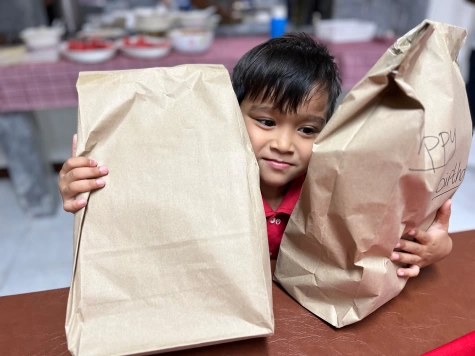
Four months ago, whenever I had a chance to talk with him, the topic of our conversation was always his birthday. He was already excited for his next birthday! But, unlike other children who come up to me telling me what birthday gifts they want to receive, this boy had asked that he and I should celebrate our birthdays together, since mine is in April. He wants me to pray for him on his birthday and that he will pray for me.
This exchange of conversation has been going on since then. What struck me the most is this five-year-old boy giving a particular importance for prayer, birthday prayer to be specific. This is our hope. For children to have a heart of prayer. And for us at CSC, to be picked by the birthday celebrant to pray for them is such an honor. If you are celebrating your birthday or just celebrated your birthday, I pray that you will be a blessing to others and that the Lord will use you mightily!
S.M.I.L.E.
"A smile is worth a thousand words."
Julie A. Walker
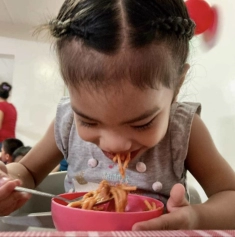
Most, if not all, of the children who come to CSC find it challenging to convey their feelings. While very few can use words, most of them are not able to. Sadness or fear are usually expressed in silence, tears, tantrums, or stomach aches. Joy or happiness is expressed in hugs, drawings, flowers, or petals picked along the driveway, and mostly in SMILES.
A child's smile keeps us going. When days are long and overwhelming, the genuine smiles on our children's faces give us the strength to carry on.
A child's smile reminds us to count our blessings, especially during the days when we lack cheerfulness and forget all the good things.
A child's smile speaks gratitude to our hearts. Even when words are absent, we still hear their "thank you's."
A child's smile is contagious. Even when our hearts are heavy, we smile because they do.
A child's smile matters because not all children can or will smile at CSC. But when they do, we know our language of love speaks to their hearts.
A CSC child's ...
S – smile gives warmth
M - making our day bright,
I - inspiring us to not give up,
L – leaving a mark in our hearts, and
E – encouraging us to look forward to brighter days ahead.
Dear child,
Thank you for your smile. You don't know how many hearts you have touched when you smile.
May God continue to put a smile on your face and make us instruments for such. May your smile
reflect God's sweet embrace and loving touch in your life today and always.

A Happy Attitude Leads to Greatness
As the eldest of nine siblings, I was always responsible for most of the household tasks. I used to whine
about the chores my parents gave me. But then my father told me that no matter how simple a task is,
like picking up a spoon, if you don't put love into it, it will be difficult.
From that point forward, I used that simple concept to accomplish my goals, and I was pleased that I
was successful in several ways.
In my teaching career, I apply this through our morning meeting activities in the classroom. Morning
meetings are a school-wide classroom management strategy that meets kids' social-emotional learning needs regularly. Every morning, teachers assemble their students in a circle for 15 to 30 minutes to socialize and start the day. This classroom management technique is a fantastic help for us teachers as we transition students to their goals in class. I can tell which students require more time to code-switch
their feelings into a learning mindset, transforming negative emotions into positive ones.
In my eight years of teaching at CCHS, I've noticed that kids who are emotionally preoccupied with
unnecessary thoughts are unable to comprehend the concept being taught and it is challenging for them to retain the information.
To assist the students, I allow them time to process their feelings/thoughts that were unrelated to the
classroom discussion and be ready once they are inside the classroom, or I explained their role
through pre- or post-class discussion. Then, tell them that there is a time for everything, and to set aside
what initially bothers them and focus on the purpose of their coming to school and deal with their other
thoughts another time.
I believe success occurs when you have a positive attitude, choosing to love, and be cheerful in all that
you do. Being happy and contented in our daily interaction leads to great things in this world, no matter
how challenging the circumstances are.
Proverbs 15:13 says: "A happy heart makes the face cheerful, but heartache crushes the spirit."
Sparks of Joy
Aristotle once remarked, "The whole is greater than the sum of its parts," yet holistic well-being often falters when individual elements are neglected. Thus, the Tibuok ug Kabahin (whole and part) initiative for mental health awareness came into being. This endeavor spotlights the complete spectrum of emotional, psychological, and social well-being, collectively defining our mental health. It underscores how these facets influence our responses to stress, interactions with others, and the choices we make.
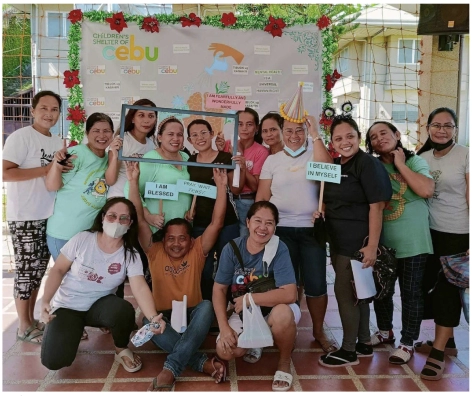
Having had the opportunity to care for children with a range of adverse experiences, we encounter indirect trauma and carry our own stories of adversity. Our joy is often stolen from us due to these experiences, emphasizing the need to prioritize mental health to maintain a healing atmosphere.

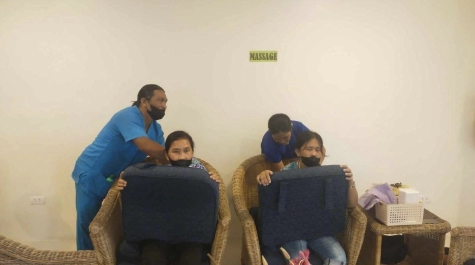

Through the initiative, we were able to foster fellowship and create a space where vulnerability was encouraged. It provided us with a sense of being seen and heard. It was a moment to take a long sigh after years of working hard, indulging in good food and massages, and sharing laughter. Not only did it raise awareness about the importance of mental health and well-being, but it also gave us an opportunity to embrace our stories, no matter how complicated, painful, or heavy they were. And that brought healing to each one of us.

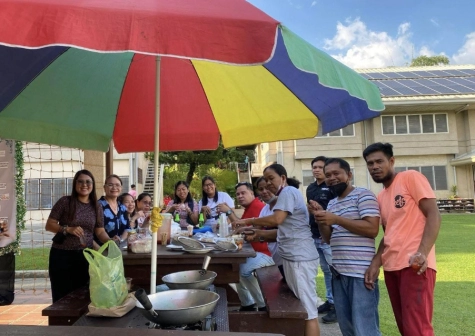
Overall, the Tibuok ug Kabahin (whole and part) initiative serves as a testament to the transformative power of acknowledging and prioritizing mental health, fostering an environment where healing becomes a shared endeavor. May we continue to cultivate spaces that encourage vulnerability, celebrate the human experience, and inspire the pursuit of joy, both in our personal lives and within the workplaces that shape our daily existence.
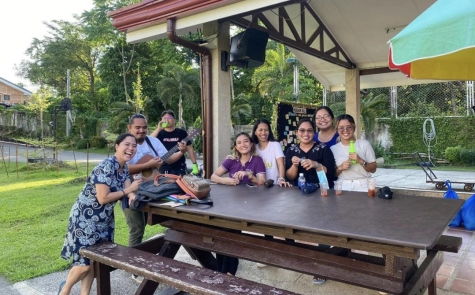
Looking Forward!
Blessed to be a Blessing
Another year is upon us. Already! Someone once said, "The days are long, but the years are short." I'm not so sure any more. It seems that time is moving faster and faster, at lease for me it is. So, what do we do?! We LOOK FORWARD with anticipation for all that God will do with the time He gives us and consider ourselves BLESSED—and blessed to be a blessing.
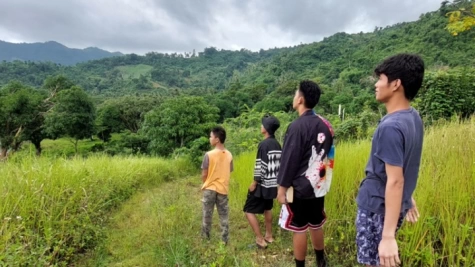
Henri Nouwen writes, "It is remarkable how easy it is to bless others, to speak good things to and about them, to call forth their beauty and truth, when you yourself are in touch with your own blessedness. The blessed one always blesses. And people want to be blessed! The voice that calls us the Beloved will give us words to bless others and reveal to them that they are no less blessed than we."
For CSC, the new year holds countless opportunities. There will be birthdays to celebrate. There will be comings and goings of children who enter our homes and those who are placed with families. There will be many milestones to celebrate, both for the children in our care AND for the employees who care for them. Not to mention there is a massive construction project going on currently that, Lord willing, will be ready for move-in at the end of the year—but such much to do before then for that to happen!

We at CSC commit the year to upholding our Mission as a way of being blessed to be a blessing. We know first and foremost that we exist to glorify God and demonstrate His love to those around us—being a blessing. We look forward to all that comes our way and we hope that, just maybe, you will cross our path at some point in the year, too.
Blessings,





